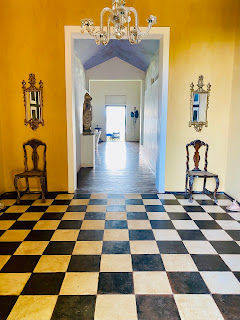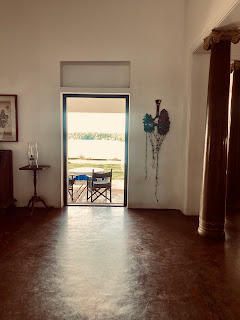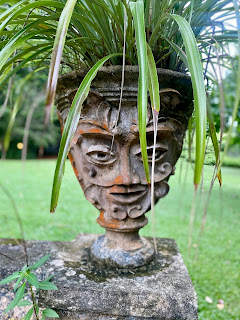Geoffrey Bawa’s Lunuganga Estate is so so much more than a resort…
Don’t go to Lunuganga if you want buzz and or people or excitement. You won’t find it there.
You’ll find ten rooms spread over fifteen acres.
You’ll find an infinity pool overlooking a silver river that feels like it belongs to you and you alone.
You’ll find a million stars in the sky and the hooting of owls.
You’ll find a lotus pond in the shape of a butterfly and a giant head of the Greek god Pan.
You’ll find a stone leopard guarding a water gate and a garden full of giant jars.
You will find stillness. And silence. And a feeling of time standing still.
You’ll find one man’s genius expressed and come to life.
You will see how it nourished his soul.
You will find harmony and imagination, wonder and beauty.
You will even find the sound of your own breath slowing down and easing.
But you won’t find the Bali vibe and the Phuket energy or the perfectly manicured, state of the art rooms and the endless options and activities of modern luxury resorts.
Lunuganga is an alternative approach to luxury. More thoughtful. More cerebral. More soulful. More respectful. More authentic. More everything that isn’t just about consumption and materialism.
I won’t use this piece to describe the wonderful food and incredible service. It is enough for me to say that it was more attentive and warm than most global luxury brands. But this piece is about something more. It is about Geoffrey Bawa himself and how the experience of Lunuganga allows us to see the world through his eyes.
Geoffrey Bawa designed many hotels in his lifetime. Places that bear testament to his unique approach. The intermingling of indoor and outdoor spaces. The sense of purpose behind every element. The unison with nature, culture and environment. The use of native materials and techniques.
But nothing exemplifies his vision as much as Lunuganga. This tropical take on an English garden is the fullest expression of Geoffrey Bawa, completely free of any commercial or utilitarian constraints. To stay there is to be transported to a magical, fantastical space, filled with whimsy and where the rhythms of the day haven’t really changed for a half century or more.
Everyone will have their own favourite spots that they will discover and come to love. The giant Pan’s head, with the features of a Hindu god. The many quirky statues scattered around the place… Roman emperors and Australian punks, neo classical Greek boys and stealthy leopards. Or the sculptures you notice in every room.. Trojan horses and a Tamil Natraj, primitive stone idols and modernist metal abstractions. We spent four days at Lunuganga and every day we noticed something new, a little flourish that lay waiting to be discovered.
But it isn’t just what’s inside the rooms but the rooms themselves that are a thing of wonder. The seamless integration of indoor and outdoor spaces. The use of local materials, not just for construction but also for colour. The oneness of the man made construction and the verdant nature that surrounds it. The wilful insistence on letting nature have its say, to let moss grow, to let the rain and the sun temper and change the shade of paint, to not insist on an artificially imposed state of pristine perfection. This embrace of nature and its impact, this seeking of a more harmonious, intimate relationship with nature, without asserting dominance or control, this is what makes Geoffrey Bawa’s work so path breaking and ahead of it’s time, an architectural singularity that stood apart from the monumental architects winning Pritzker Prizes in the 20th century.
It is when we look outside the rooms and the open doors and wide windows into the garden that we truly understand what Bawa sought to accomplish. The butterfly shaped pond, surrounded by paddy, and where the water is channelled through a narrow canal to create the body, surrounded by large lotus ponds for the wings. The giant trees shaped like bonsai to create a uniformity of height separating the hills, the gardens, the living quarters and the silent river.
You sit at the breakfast table and look across the beautiful sloping avenue surrounded by soaring trees, a glimpse of the river in the distance bringing a gentle breeze and you get a glimpse of perfection. But even this perfection required thought and skill. There is a hedge midway through the avenue, a surprising but beautiful visual choice that you assume is aimed to create some sort of relief and avoid a monochromatic flat plane of light green. But it isn’t so. Because this was originally two properties… a plantation house and a hill of cinnamon trees separated by a village road. So it’s only when you walk towards the river, past the passageway below a cottage on one side of the hedge, that you realise that there is a gap between the hedge, with a sunken road eight feet wide, that allows people and transport to go past without interfering with the view above ground. An optical illusion that serves a functional purpose without disturbing the sense of tranquility and harmony.
But this isn’t just about a visual spectacle. Every space has a purpose. A place to sit and eat breakfast by the garden, immersed in birdsong. A swimming pool that you almost stumble upon, hidden below the sloping lawn and covered by trees, blending into the silver river. Workspaces in the shady, airy rooms, filled with light and cooled by cross ventilation. Gin and tonics at sunset, seeing the sky transforming into deepening shades of purple and ochre and the river slowly lose its shimmer and reveal hidden depths. Dinner in the verandah as the creatures of the dark give voice under a silver moon and the scent of jacaranda fills the night air.
Lunuganga isn’t really a resort.
It isn’t really a museum.
It’s hard to describe what it is.
But you could travel the world and struggle to find more than handful of places with such an evocative sense of time and place.
I don’t know what you as a traveler will find in Lunuganga. But I promise you that whatever it is, it will nourish your soul, and it will be truly, utterly and compellingly your own.



























Comments